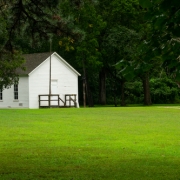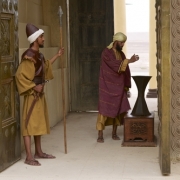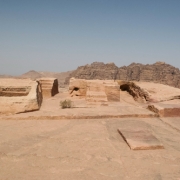Safety in Fellowship with God
/0 Comments/in Weekly Devotional/by David GuzikIn the second year of Pekah the son of Remaliah, king of Israel, Jotham the son of Uzziah, king of Judah, began to reign…. And he did what was right in the sight of the LORD; he did according to all that his father Uzziah had done. However the high places were not removed; the people still sacrificed and burned incense on the high places. He built the Upper Gate of the house of the LORD. (2 Kings 15:32, 34-35)
After the reign of Uzziah, his son Jotham because king. In general, he was a good king – he did what was right in the sight of the LORD. In a time when there was chaos and wickedness in the northern kingdom, there were some good and godly kings in Judah. His father Uzziah set a good example for Jotham, and He did according to all that his father Uzziah had done. A godly father, even if flawed, can have a tremendous positive impact upon his sons.
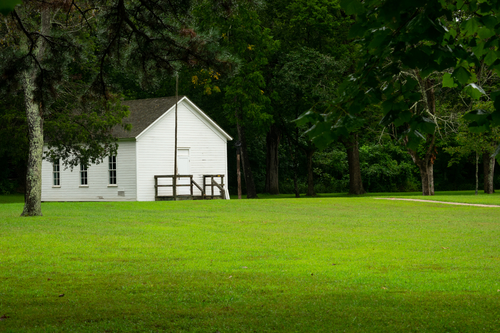
One thing that Jotham did catches our attention: he built the Upper Gate of the house of the LORD. This was always a positive sign in Judah. When kings and leaders were concerned about the house of the LORD, it reflected some measure of spiritual revival.
In particular, it seems that Jotham rebuilt the link between the temple and the palace. Most likely, this was access between the royal palace and the temple. Jotham wanted there to be a strong link between the royal house and the house of God. We can say that this was one of the keys to his prosperity and success.
Jotham’s father Uzziah misunderstood the link between the royal house and the house God when he demanded priestly authority (2 Chronicles 26:16-21). Many kings before Jotham wanted no link between the royal house and the house of God. Jotham understood that he was a king and not a priest, yet he wanted a good, open link between the palace and the temple.
2 Chronicles 27:6 says, So Jotham became mighty, because he prepared his ways before the LORD his God. The building of this link between the palace and the temple was one of the chief ways that he prepared his way before the LORD. That access between the palace and the house of God – a link without control – provided better security for Judah than a mighty wall around Jerusalem. In a time when the northern kingdom of Israel was attacked by the Assyrians, during the reign of Jotham Judah was safe.
The safest place we can be is in obedient communion with God. That was the key to Jotham’s success. How is your access to the house of God? Has it broken down? Are you missing true Christian fellowship? Ask God for the wisdom and opportunity to build your own “Upper Gate” to the house of the LORD, the community of God’s people.
Das traurige Ende eines guten Königs
/0 Comments/in Uncategorized, Wöchentliche Andacht/by David GuzikThe Sad End of a Good King
/2 Comments/in Weekly Devotional/by David GuzikThen the LORD struck the king, so that he was a leper until the day of his death; so he dwelt in an isolated house. And Jotham the king’s son was over the royal house, judging the people of the land. (2 Kings 15:5)
King Azariah (also known as Uzziah) was one of the better kings of Judah. In many ways he honored God and he had a lot of success and power. Yet even good kings have their problems, and Uzziah didn’t end well. He died a leper and a disgrace – because he could not handle his success and power.
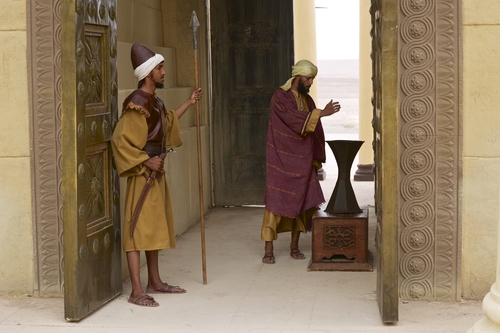
2 Kings 15 tells us it happened, but we learn a lot more about the tragedy of Uzziah’s end from 2 Chronicles 26. There, we read this about King Uzziah who was marvelously helped till he became strong (2 Chronicles 26:15). 2 Chronicles tells us about Uzziah’s pride, seen when he was strong and successful: but when he was strong his heart was lifted up, to his destruction, for he transgressed against the LORD his God by entering the temple of the LORD to burn incense on the altar of incense (2 Chronicles 26:16). The priests tried to stop him, but the king insisted on forcing his way into the temple to offer incense.
Uzziah (Azariah) violated what had become a general principle in God’s dealing with Israel: that no king should also be a priest. It was God’s plan that the offices of prophet, priest, and king should not be combined in one man – until the Messiah, who fulfilled all three offices.
In his last days, he dwelt in an isolated house. Uzziah came into the temple as an arrogant king, but he left as a humbled leper. Indeed, he hurried to get out, because the LORD had struck him (2 Chronicles 26:20). The actual penalty for violating the sacred place of the temple was death (Numbers 18:7). Instead, God struck Uzziah with leprosy, a disease that has been described as a living death.
Even with his tragic end, God used Uzziah even in his death, when he rested with his fathers. His passing contributed to the call of the prophet Isaiah: In the year that King Uzziah died, I saw the LORD sitting on a throne (Isaiah 6:1).
Therefore, when Isaiah wrote that he was called in the year King Uzziah died, he said a lot. It was to say, “In the year a great and wise king died.” But it was also to say, “In the year a great and wise king who had a tragic end died.”
The prophet Isaiah had great reason to be discouraged and disillusioned at the death of King Uzziah, because a great king had passed away, and because his life ended tragically. Yet despite it all, he saw the enthroned LORD God who was greater than any earthly king.
Can you see God, enthroned and greater than all your disappointments?
Überraschende Barmherzigkeit
/0 Comments/in Wöchentliche Andacht/by David GuzikDieser eroberte das Gebiet Israels zurück, von Lebo-Hamat an bis an das Meer der Arava, nach dem Wort des Herrn, des Gottes Israels, das er geredet hatte durch seinen Knecht Jona, den Sohn Amittais, den Propheten aus Gat-Hepher. Denn der Herr sah das so bittere Elend Israels, daß Mündige und Unmündige dahin waren und es keinen Retter für Israel gab. Und der Herr hatte nicht gesagt, daß er den Namen Israels unter dem Himmel austilgen wolle; deswegen half er ihnen durch Jerobeam, den Sohn des Joas. (2. Könige 14,25-27)
Diese Verse erzählen uns von der Regierung Jerobeams, dem König von Israel. In 2. Könige 14,24 lesen wir, dass „er tat, was böse in den Augen des HERRN war.“ Doch wir sehen hier drei überraschende Dinge, die Gott zur Zeit des Jerobeam tat.

Erstens sehen wir einen überraschenden Propheten: Nach dem Wort des HERRN, des Gottes Israels, das er geredet hatte durch seinen Knecht Jona, den Sohn Amittais, den Propheten aus Gat-Hepher. Das ist mit ziemlicher Sicherheit derselbe Jona, der für seine Reise nach Ninive bekannt wurde. Offensichtlich hatte er auch einen Dienst in seinem eigenen Volk und nicht nur in Ninive, wie es im Buch Jona geschrieben steht. Es ist gut, sich bewusst zu machen, dass Gott durch die Propheten damals viel mehr tat, als wir allgemein denken.
Zweitens sehen wir die Treue Gottes: Und der HERR hatte nicht gesagt, dass er den Namen Israels unter dem Himmel austilgen wolle. Auch wenn Israel Gott gegenüber so oft untreu geworden war, würde Er ihnen treu bleiben. Er wirkte sogar durch einen gottlosen Mann wie Jerobeam, um sie zu retten, als es keinen Retter für Israel gab.
Und schließlich sehen wir die überraschende Barmherzigkeit Gottes: Dieser eroberte das Gebiet Israels zurück…denn der HERR sah das bittere Elend Israels. In Seiner großen Barmherzigkeit war Gott freundlich zu Israel, das von einem bösen König regiert wurde. Diese barmherzige Wiederherstellung zeigte sich auf viele Arten. Israel gewonn verlorene Gebiete zurück, und sie kamen in den Genuss von Wohlstand.
Dafür gibt es archäologische Beweise. Ausgrabungen antiker israelischer Städte zeigen, dass zur Zeit von Jerobeams Regierung größere und luxuriösere Häuser gebaut wurden. Als Israel Zerstörung und Mangel verdient hatte, gab Gott ihnen überraschende Barmherzigkeit durch ihren bösen König Jerobeam. Doch im Buch Amos können wir lesen, dass Israel nicht gut mit diesem Wohlstand umging, und die Boshaftigkeit, die sie unter dem Wohlstand von Jerobeam dem zweiten zeigten, brachte nur größeres Gericht auf sie.
Freunde, Gott hat uns große Barmherzigkeit – überraschende Barmherzigkeit – in Jesus Christus erwiesen. Er hat uns unsere Sünden vergeben und uns, durch das, was Jesus am Kreuz tat, eine Beziehung zu Ihm möglich gemacht. Gott hat Gebiete zurück erobert, die dir von der Welt, dem Fleisch und dem Teufel genommen wurden und hat dir in vieler Weise Wohlstand gegeben.
Wie wirst du auf Seine überraschende Barmherzigkeit reagieren? Bitte vergiß nicht, dich Gott unterzuordnen und Ihn zu ehren, wenn Er dir große Barmherzigkeit zeigt.


